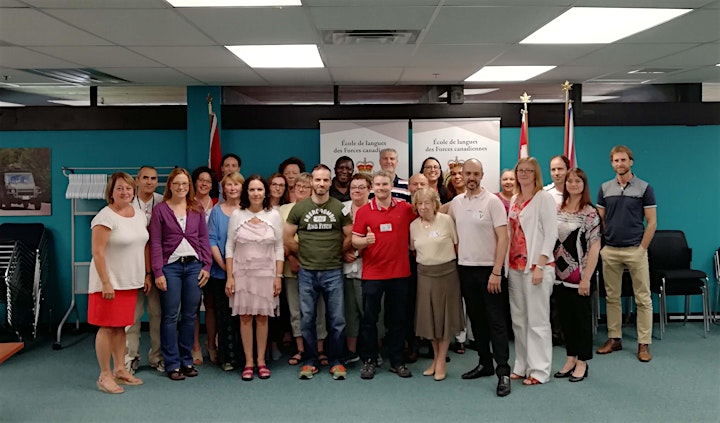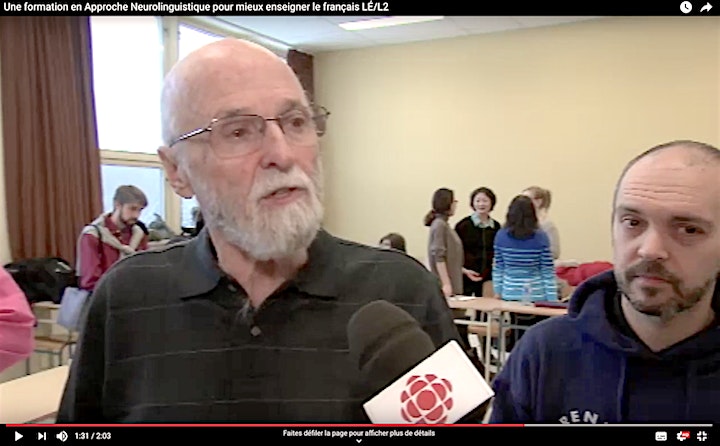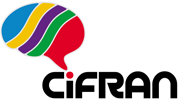juin, 2023
Détails d'activité
Initial training in the Neurolinguistic Approach to teaching second/foreign languages ***WARNING : The actual dates for the NLA1
Plus
Détails d'activité
***WARNING : The actual dates for the NLA1 initial training are the 9th, 12th, 13th, 14th, 15th & 16th 2023***
OBJECTIVES
This training workshop allows participants to acquire both the theoretical foundations of and practical experience in the essential teaching strategies that are at the heart of the Neurolinguistic Approach.
APPROACH
The workshop introduces the authentic communication approach, which allows language learners to develop the fluency and accuracy needed to acquire linguistic competency from the earliest levels, all the while fostering strong motivation during the entire learning process.
PUBLIC
Intended for second- or foreign-language teachers, as well as for future teachers and education supervisors.
VOLUME
This 55-hour course is divided into 35 in-class workshop hours and 20 hours of personal work (guided autonomy), 5 to be completed before the workshop and 15 after. This 55-hour course leads to an NLA1 Certificate (Certified NLA Practitioner).

NLA 1 WORKSHOP › ÉCOLE DE LANGUES DES FORCES CANADIENNES (GATINEAU, CANADA) (Steeve Mercier, Joan Netten, Olivier Massé )
The Neurolinguistic Approach (NLA) for acquiring a second or foreign language (L2/FL) is a new paradigm for teaching/learning L2/FL communication skills in an institutional setting.
A NEW METHODOLOGICAL APPROACH
This new approach was designed by Claude Germain (Emeritus Professor, UQAM and South China Normal University) and Joan Netten (professor, Memorial University of Newfoundland) in the context of the emerging influence, in education, of neuroscience. It is based on M. Paradis’ neurolinguistic theory of bilingualisms (1994, 2004, 2009), as well as on studies in cognitive neuroscience by N. Ellis (2011) and N. Segalowitz (2010); it is also influenced by the views of L. Vygotsky (1934/1985) on the role played by social interaction in learning.
FIVE FUNDAMENTAL PRINCIPLES
These were set out by C. Germain and J. Netten (2011, 2012), who define the conditions for maximising the potential of learners’ brains in the classroom when the goal is, firstly, to develop the ability to spontaneously communicate orally in an L2/FL, i.e. to build an internal language proficiency that optimises the subsequent development of reading and writing skills (Germain and Netten, 2013).
AN APPROACH BASED ON AUTHENTIC COMMUNICATION
The NLA bases itself on the use of authentic communication and on exploiting social interactions. In this way, it allows learners to develop the necessary intelligibility and spontaneity, while also boosting their motivation through the whole learning process, which explains its growing popularity across the globe among teachers who find here the proof of its efficiency, alongside the empirical on-the-ground research that attest of its results.
The NLA thus provides a double pedagogical benefit: for learners, who see rapid growth in their target language fluency and accuracy, but also for teachers, who see genuine progress with less preparation time and classroom effort than required with the methods they used previously.

NLA 1 WORKSHOP › UNIVERSITÉ LAVAL (QUÉBEC, CANADA) (Claude Germain, Olivier Massé, Steeve Mercier )
Reportage de la Télévision nationale RADIO-CANADA sur ce stage ANL (2 min)
Témoignages d’enseignants ayant suivi la formation
PROGRAM
Day 1: Theoretical framework
• The needs of language teachers/trainers, analysis of teaching practices and classroom results
• Beliefs about L2 acquisition
• The need for a new approach
• The conditions for the emergence of the Neurolinguistic Approach
• The NLA’s five fundamental principles
• Majors changes for curricula and pedagogy
• Experimental results
Day 2: Teaching strategies for oral proficiency
• The deadly sins, or common inefficient teaching strategies
• The 7 deadly sins for oral development
• Demonstrations of effective NLA strategies
• Simulations
• Practice in real classrooms (with real learners)
Day 3: Teaching strategies for reading
• The 3 deadly sins for reading development
• Demonstrations of effective NLA strategies
• Simulations
• Practice in real classrooms (with real learners)
Day 4: Teaching strategies for writing
• The 3 deadly sins for writing development
• Demonstrations of effective NLA strategies
• Simulations
• Practice in real classrooms (with real learners)
Day 5: Review and synthesis
• Review of teachers’ common beliefs
• Review of the neurolinguistic theory and neuroeducation
• Review of the participants’ practices and the learners’ reactions
• Discussions on how to adapt workshop content to the participants/teachers’ teaching contexts
• CiFRAN’s research groups (NLA and others) and training follow-up
• Instructions for final task (to be handed in within 3 months for CAP-NLA validation)
• End of workshop
Heure
9 (Vendredi) 8:30 matin - 16 (Vendredi) 4:30 après-midi
Lieu
South East Cornerstone School Division No 209
80 18 Street, Weyburn, SK S4H 2W4
